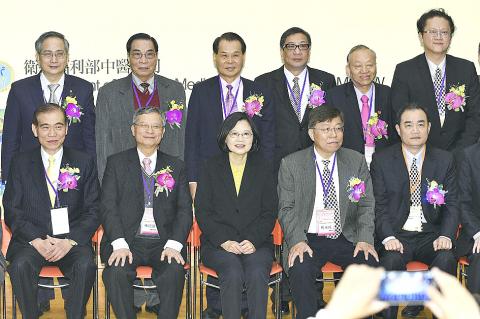President-elect Tsai Ing-wen (蔡英文) is to pursue a “new southward policy” to make a breakthrough in the nation’s diplomatic situation by pushing for international cooperation in humanitarian aid and disease prevention, branding Taiwan as a responsible key partner in the international community, according to a proposed foreign policy blueprint.
Tsai first presented her diplomatic policy platform at a reception with foreign ambassadors and representatives in Taiwan last year, at the time saying that maintaining peaceful international relations is a responsibility that all nations should share collectively.
Taiwan should maintain a strong and vivid international presence to keep the nation safe and promote diversity in trade, she added.

Photo: Chen Chih-chu, Taipei Times
Wu Chih-chung (吳志中), an associate professor of political science at Soochow University who headed a subgroup for foreign relations in a Democratic Progressive Party (DPP) think tank, on Saturday said that the foreign policy platform Tsai proposed during campaigning ahead of January’s elections — including maintaining peace and stability in the region, improving partnerships with diplomatic allies and reinforcing the nation’s international presence with the new southward policy — should be in line with expectations that the international society has of a DPP government.
To maintain “sustainable partnerships” with diplomatic allies, Tsai has said that the DPP government would actively interact with them through mutual cooperation between government, businesses and civic groups, aimed at deepening relationships.
At the same time, the DPP government would seek to bolster economic and cultural ties with the US and Japan based on principles of mutual trust, respect and communication.
Tsai said that she would seek to protect national interests by engaging in meaningful dialogue on regional economic integration and security with the US and Japan.
As for Europe, the DPP would seek to explore cooperative relationships in the areas of innovation, high-tech, “green” energy, as well as interacting through exchanges between young people and non-governmental organizations (NGO), she said.
For the new southward policy, the government would create a special taskforce to boost economic and cultural exchanges with Southeast Asian nations and India, as well as “citizen diplomacy,” she said.
At the same time, the Executive Yuan would create offices aimed at dealing with economic and trade talks, including the Trans-Pacific Partnership trade pact, the president-elect said.
In addition, the DPP government would push to create an international NGO center, making Taiwan a leader in supporting NGO operations and supporting progressive ideologies and values in the Asia-Pacific region.

Taiwan has received more than US$70 million in royalties as of the end of last year from developing the F-16V jet as countries worldwide purchase or upgrade to this popular model, government and military officials said on Saturday. Taiwan funded the development of the F-16V jet and ended up the sole investor as other countries withdrew from the program. Now the F-16V is increasingly popular and countries must pay Taiwan a percentage in royalties when they purchase new F-16V aircraft or upgrade older F-16 models. The next five years are expected to be the peak for these royalties, with Taiwan potentially earning

STAY IN YOUR LANE: As the US and Israel attack Iran, the ministry has warned China not to overstep by including Taiwanese citizens in its evacuation orders The Ministry of Foreign Affairs (MOFA) yesterday rebuked a statement by China’s embassy in Israel that it would evacuate Taiwanese holders of Chinese travel documents from Israel amid the latter’s escalating conflict with Iran. Tensions have risen across the Middle East in the wake of US and Israeli airstrikes on Iran beginning Saturday. China subsequently issued an evacuation notice for its citizens. In a news release, the Chinese embassy in Israel said holders of “Taiwan compatriot permits (台胞證)” issued to Taiwanese nationals by Chinese authorities for travel to China — could register for evacuation to Egypt. In Taipei, the ministry yesterday said Taiwan

Taiwan is awaiting official notification from the US regarding the status of the Agreement on Reciprocal Trade (ART) after the US Supreme Court ruled US President Donald Trump's global tariffs unconstitutional. Speaking to reporters before a legislative hearing today, Premier Cho Jung-tai (卓榮泰) said that Taiwan's negotiation team remains focused on ensuring that the bilateral trade deal remains intact despite the legal challenge to Trump's tariff policy. "The US has pledged to notify its trade partners once the subsequent administrative and legal processes are finalized, and that certainly includes Taiwan," Cho said when asked about opposition parties’ doubts that the ART was

If China chose to invade Taiwan tomorrow, it would only have to sever three undersea fiber-optic cable clusters to cause a data blackout, Jason Hsu (許毓仁), a senior fellow at the Hudson Institute and former Chinese Nationalist Party (KMT) legislator, told a US security panel yesterday. In a Taiwan contingency, cable disruption would be one of the earliest preinvasion actions and the signal that escalation had begun, he said, adding that Taiwan’s current cable repair capabilities are insufficient. The US-China Economic and Security Review Commission (USCC) yesterday held a hearing on US-China Competition Under the Sea, with Hsu speaking on